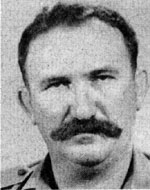Son of Shmuel David and Rivka. He was born on the 1st of Cheshvan, October 27, 1927, in Romania. In 1935, the family immigrated to Israel, when Avraham was only eight years old. Avraham studied in an elementary school in Rechovot. A year after the family arrived in Israel, his father received a position of guard, at the slaughterhouse in Rechovot. At the outbreak of World War II, and before he graduated from school, young Abraham was drafted into the Palmach. While he was walking in the orchards of Rechovot, he began to learn Arabic, but only after he began working as a field guard, at the top of the Galilee mountains, did he begin to know the way of life of the Arab neighbors. He was especially attracted to the Bedouin life, and he adapted the tribes’ dialects, to their clans, and learned their customs. Thanks to his proficiency in Arabic and Arab life, he joined the Sayeret, and participated in numerous raids. In 1953, he married, and settled in the Beit Shean immigrant settlement. Afterward, they moved to Tiberias, where he began to work in immigrant absorption, in the capacity as regional supervisor of Amidar. He became an excellent explorer, with experience as a scout. He became interested in his many tours of the past, and thus became a collector of ancient coins. He was officially drafted into the IDF in late October 1959. He settled in Ashkelon, and soon became popular with all the people in the area. Since he did not abandon the Arab issue, he was considered an expert on relations with the neighboring people. He was assigned to the administration of the military government after the Six-Day War, and was appointed governor of Rafah, where he proved himself to be a military governor. Thanks to his familiarity with the customs of the Arab people, Avraham acquired the trust of the Bedouins, and established young armed guard units among the young tribesmen, in order to prevent the infiltration of terrorists. Egypt and the heads of the sabotage organizations were upset, and began to search for him, a fact known to Avraham. Several times, terrorist groups were infiltrated into Rafah, in order to kill him. But he continued to govern wisely, and succeeded, until his last day. Two Arab friends entered his house, and informed him of an explosion on the dirt road leading to the large refugee camp in Rafah. Avraham, as the Minister of Defense Moshe Dayan wrote of him on his grave, did not even say “after me”. He went out on his own, got in his car and without hesitation, traveled with the two Arabs and his loyal assistant, Shmuel Freddy, to the refugee camp. They checked the area, and, upon returning, its wheels hit two mines. On the spot, his assistant and Avraham were killed, and the two Arabs were seriously wounded. He was immediately flown to the hospital in Be’er Sheva. When he regained consciousness, he asked Brigadier General Motta Gur, who visited him, not to impose a curfew on the city, so as not to cause unnecessary suffering to the citizens, to which Avraham was associated. For nearly three weeks, Avraham fought for his life, and died of his wounds, on the 10th of Shevat, January 29, 1969. He left behind a wife and two daughters. He was laid to rest in the cemetery in Ashkelon. The funeral was attended by thousands of people, including Colonel Mordechai Gur, the commander of the IDF forces, in the Gaza Strip, the mayor of Ashkelon, and the lieutenant colonel Mordechai Firon, who eulogized him. In the book “Yad Lanoflim – Bnei Ashkelon”, published by the municipality, his name was memorialized..
